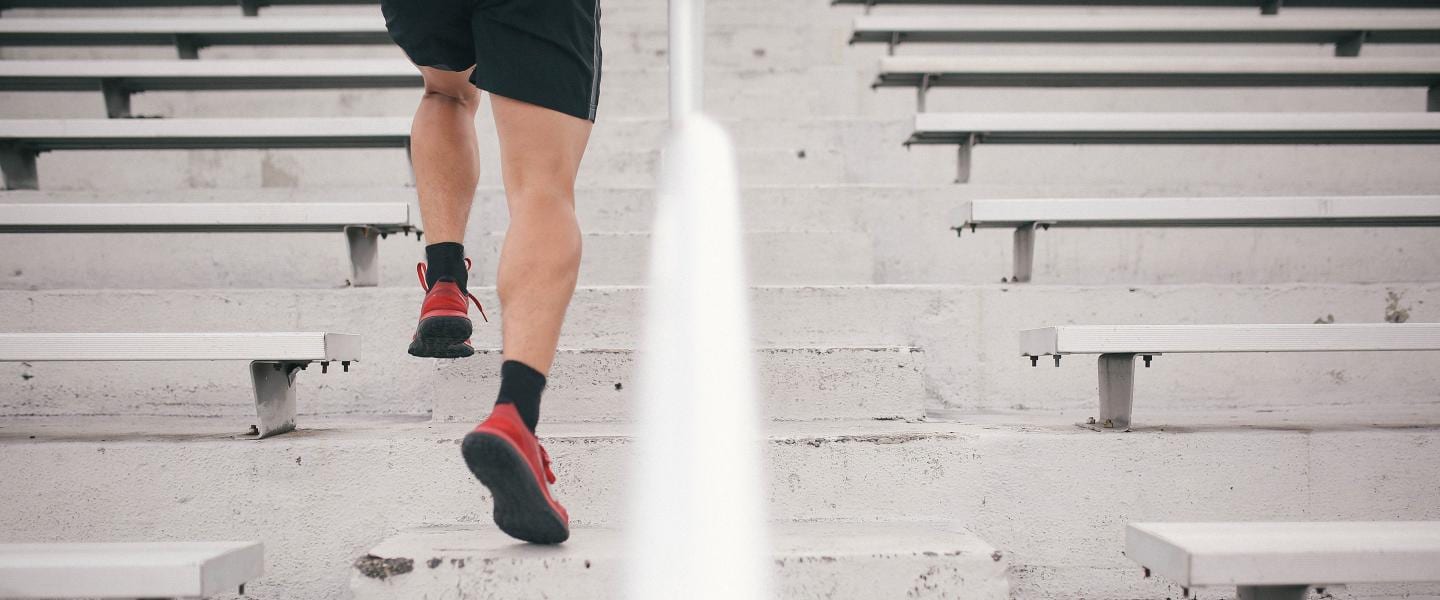When you buy through our links, we may earn a commission. Products or services may be offered by an affiliated entity. Learn more.
Sleep, Athletic Performance, and Recovery
Athletes know that physical activity is an important component of a healthy lifestyle. Regular exercise increases longevity and reduces the risks of cardiovascular disease, diabetes, and some cancers. Exercise can also reduce the risk for anxiety and depression, and it can help you sleep better.
In order to perform their best, athletes must prepare in every aspect of their lives. They train regularly, eat healthy meals and snacks, and make time for rest, recovery, and sleep. When one area is lacking, overall performance can suffer. Sleep is certainly no exception!
Why Is Sleep Important For Athletes?
For both athletes and non-athletes, sleep is essential for overall health and wellbeing. Everyone needs sleep in order to feel restored and function their best the next day. Other physical benefits include:
- Allowing your heart to rest and cells and tissue to repair. This can help your body recover after physical exertion. Also, as you progress through the stages of sleep, the changes in your heart rate and breathing throughout the night promote cardiovascular health.
- Preventing illness or helping you recover from illness. During sleep, your body produces cytokines, which are hormones that help the immune system fight off infections.
All of these restorative effects are important for athletes’ recovery and performance.
How Sleep Helps an Athlete’s Mental State
Sleep helps everyone to retain and consolidate memories. When athletes practice or learn new skills, sleep helps form memories, and contributes to improved performance in the future. Without sleep, the pathways in the brain that allow you to learn and make memories can’t be formed or maintained.
Sleep is also essential for cognitive processing. Loss of sleep is associated with a decline in cognitive function. This can have adverse effects on athletes whose sports require a high level of cognitive function, such as decision making and adapting to new situations.
Also, just as exercise can help improve or maintain mental health, sleep is important for maintaining athlete’s mental health. Quality sleep is associated with improving overall mood. Healthy sleep prevents irritability and decreases the risk of developments such as depression.
Looking to improve your sleep? Try upgrading your mattress.
How Does Sleep Affect Athletic Performance?
Both increased quantity and quality of sleep helps athletes improve performance in many areas related to the demands of the sport.
- A Stanford study of men’s basketball players who extended their sleep to 10 hours a night found several positive outcomes. The players ran faster in both half-court and full-court sprints. Their shooting improved by at least 9% for both free throws and three-point shots. The athletes also reported improved physical and mental well-being.
- Male and female swimmers who extended their sleep to 10 hours also saw many performance improvements. Reaction times off diving blocks were faster, turn times were improved, and kick strokes increased. Times swimming a 15-meter sprint also improved. Additionally, these athletes experienced improved mood and decreased daytime sleepiness and fatigue.
- Varsity tennis players, male and female, who increased their sleep to at least nine hours a week also performed better. The accuracy of the players’ serves increased significantly from about 36% to nearly 42%. The players experienced less sleepiness as well.
- Other studies of female netball players and male soccer players have demonstrated that sleep hygiene education helps athletes increase their overall sleep time. This adequate sleep before a competition is likely to encourage top performance.
A Lack of Sleep Affects an Athlete’s Performance
Poor quality and quantity of sleep lead to several negative effects in any person. Mentally, sleep deprivation reduces the ability to react quickly and think clearly. People who are sleep deprived are more likely to make poor decisions and take risks. A lack of sleep also increases irritability and risk for anxiety and depression. Physically, a lack of sleep increases the risk for many medical concerns, including type 2 diabetes, high blood pressure, kidney disease, and stroke.
While quality sleep has positive effects specifically on athletic performance, a lack of sleep is detrimental to performance. A great number of concerns can arise when athletes do not receive adequate sleep:
- Inhibited ability. In a study of male team-sport athletes who were sleep-deprived, average and total sprint times decreased.
- Decreased accuracy. After sleep deprivation, male and female tennis players had decreased serve accuracy of up to 53% when compared to performance after normal sleep.
- Quicker exhaustion. In a study of male runners and volleyball players, both groups of athletes exhausted faster after sleep deprivation.
- Decreased reaction time. A lack of sleep adversely affected reaction time in a studied group of male collegiate athletes.
- Difficulty learning and decision making. Executive functions are impacted by a lack of sleep. Choices such as passing the ball or taking it to the net yourself can be more difficult or made too late.
- Risk for injury. Research of middle and high school athletes revealed that a chronic lack of sleep is associated with increased rates of injury.
- Risk for illness or immunosuppression. Poor sleep habits are associated with lower resistance to illness, such as the common cold.
How Is Sleep Different For Athletes?
Evidence shows that more sleep, or extended sleep, can benefit athletes, their recovery, and their performance. Recommendations for athletes range between seven and nine hours nightly. Elite athletes are encouraged to get at least nine hours of sleep nightly and to treat sleep with as much importance as athletic training and diet. In contrast, people who exercise moderately likely do not need as much sleep as elite performers. Standard sleep guidelines are appropriate.
While it is not recommended for some sleepers, such as those with insomnia, napping after a night of inadequate sleep can benefit athletes. Athletes who anticipate a night of inadequate sleep can also benefit from extending their sleep in the nights beforehand. Additional sleep is encouraged before events such as traveling to competitions, before a heavy competition, and during times of illness or injury.
For some types of athletes, waking early has more of a negative impact than staying up late. A study of judo athletes showed that sleep deprivation at the end of the sleeping time (i.e., early morning) decreased power and muscle strength the following day. If early wake times are affecting your performance, consider consulting your coach to determine a training and competition schedule that best meets your needs.
Stages of Sleep for Athletes
Different functions happen throughout each of the stages of sleep, and all are necessary in order to have healthy sleep. But are there any parts of the sleep cycle that are particularly beneficial to athletes?
The results of a study of Norwegian chess players suggest so. Of the players studied, those who improved their chess ranking had different sleep patterns from the players whose chess rankings dropped. The sleep patterns of the improved players had less rapid eye movement (REM) sleep, higher amounts of deep sleep, and lower respiration rates.
Sleep Hygiene Tips for Athletes
Sleep hygiene is important for all people to sleep well. Common components include:
- Creating an appropriate sleep environment. Your sleeping space should be dark and cool with little to no noise. Your sleep environment should be used only for sex and sleep.
- Avoid alcohol and caffeine before bedtime. These beverages can interrupt sleep or lead to more disturbed sleep.
- Stay away from electronics in the hours before bedtime. This includes TVs, cell phones, and computers. The blue light that these devices emit can affect your circadian rhythm.
- Have a wind-down routine. Activities such as reading, taking a bath, or meditating can help you relax and get ready for sleep.
- Get out of bed if you can’t fall asleep after 20 minutes of trying. Do a quiet activity in another space until you feel sleepy.
In addition to these sleep hygiene tips, other habits especially important for athletes are to:
- Avoid overtraining. Keep a consistent training schedule so as not to overexert yourself.
- Avoid training and competitions too early or too late. These can affect sleep quantity and quality, especially if your athletic schedule is inconsistent.
- Keep naps brief, if you take them at all. Naps should be no more than an hour and not taken after 3 p.m..
- Reduce stressors. Not only do mental stressors affect sleep quality, but they also impact performance overall.
Jet Lag in Athletes
Another aspect of sleep quality athletes need to consider is the effects of jet lag. When traveling to different time zones for competitions, athletes can get out of their natural circadian phase. This means athletes may experience fatigue or the inability to perform their best. For example, West Coast American football teams play significantly better during evening home games than the visiting East Coast teams.
To combat the negative effects of jet lag, athletes should consider additional sleep hygiene tips for travel:
- Prepare for travel. Adjust your sleep schedule to mimic the time of the destination you’re traveling to in order to quickly adjust to the time upon arrival. Set your watch for the destination time zone when you board the plane.
- Get enough sleep before traveling. To avoid sleep debt upon arrival, be sure to sleep prior to and during travel, if necessary.
- Make a comfortable environment. Pillows can be used for cushion and comfort. Earplugs and eye masks can help create a quiet, dark environment for sleep during a flight. Avoid distractions such as electronics.
- Stay hydrated. On the airplane, be sure to take plenty of fluids. Avoid caffeine and alcohol.
- Eat meals on the destination time. Arranging meal-times according to your destination time-zone can also shorten the time it takes to adjust to a new time zone.

Still have questions? Ask our community!
Join our Sleep Care Community — a trusted hub of sleep health professionals, product specialists, and people just like you. Whether you need expert sleep advice for your insomnia or you’re searching for the perfect mattress, we’ve got you covered. Get personalized guidance from the experts who know sleep best.
References
23 Sources
-
Division of Nutrition, Physical Activity, and Obesity, National Center for Chronic Disease Prevention and Health Promotion. (2024, April 24). Benefits of Physical Activity. Centers for Disease Control and Prevention., Retrieved January 18, 2021, from
https://www.cdc.gov/physical-activity-basics/benefits/?CDC_AAref_Val=https://www.cdc.gov/physicalactivity/basics/pa-health/index.htm -
Schwab, R. J. (2020, June). Merck Manual Consumer Version: Overview of Sleep., Retrieved January 18, 2021, from
https://www.merckmanuals.com/home/brain,-spinal-cord,-and-nerve-disorders/sleep-disorders/overview-of-sleep -
MedlinePlus: National Library of Medicine (US). (2014, April 14). Healthy Sleep., Retrieved January 18, 2021, from
https://medlineplus.gov/healthysleep.html -
National Heart, Lung, and Blood Institute. (2011, August). Your guide to healthy sleep., Retrieved January 18, 2021, from
https://www.nhlbi.nih.gov/health-topics/all-publications-and-resources/your-guide-healthy-sleep -
National Institute of Neurological Disorders and Stroke. (2022, September 26). Brain basics: Understanding sleep., Retrieved January 18, 2021, from
https://www.ninds.nih.gov/health-information/public-education/brain-basics/brain-basics-understanding-sleep -
O’Donnell, S., Beaven, C. M., & Driller, M. W. (2018). From pillow to podium: a review on understanding sleep for elite athletes. Nature and science of sleep, 10, 243–253.
https://pubmed.ncbi.nlm.nih.gov/30197545/ -
Watson, A. M. (2017). Sleep and Athletic Performance. Current Sports Medicine Reports, 16(6), 413–418
http://journals.lww.com/00149619-201711000-00011 -
Mah, C. D., Mah, K. E., Kezirian, E. J., & Dement, W. C. (2011). The effects of sleep extension on the athletic performance of collegiate basketball players. Sleep, 34(7), 943–950.
https://pubmed.ncbi.nlm.nih.gov/21731144/ -
Vitale, K. C., Owens, R., Hopkins, S. R., & Malhotra, A. (2019). Sleep hygiene for optimizing recovery in athletes: Review and recommendations. International Journal of Sports Medicine, 40(8), 535–543.
https://pubmed.ncbi.nlm.nih.gov/31288293/ -
Schwartz J, Simon RD Jr. Sleep extension improves serving accuracy: A study with college varsity tennis players. Physiol Behav. 2015 Nov 1;151:541-4. doi: 10.1016/j.physbeh.2015.08.035. Epub 2015 Sep 1.
https://pubmed.ncbi.nlm.nih.gov/26325012/ -
Skein, M., Duffield, R., Edge, J., Short, M., & Mundel, T. (2011). Intermittent-Sprint Performance and Muscle Glycogen after 30 h of Sleep Deprivation. Medicine & Science in Sports & Exercise, 43(7), 1301–1311.
https://journals.lww.com/00005768-201107000-00022 -
Reyner LA, Horne JA. Sleep restriction and serving accuracy in performance tennis players, and effects of caffeine. Physiol Behav. 2013 Aug 15;120:93-6.
https://pubmed.ncbi.nlm.nih.gov/23916998/ -
Azboy O, Kaygisiz Z. Effects of sleep deprivation on cardiorespiratory functions of the runners and volleyball players during rest and exercise. Acta Physiol Hung. 2009 Mar;96(1):29-36.
https://pubmed.ncbi.nlm.nih.gov/19264040/ -
Taheri M, Arabameri E. The effect of sleep deprivation on choice reaction time and anaerobic power of college student athletes. Asian J Sports Med. 2012 Mar;3(1):15-20.
https://pubmed.ncbi.nlm.nih.gov/22461961/ -
Milewski MD, Skaggs DL, Bishop GA, Pace JL, Ibrahim DA, Wren TA, Barzdukas A. Chronic lack of sleep is associated with increased sports injuries in adolescent athletes. J Pediatr Orthop. 2014 Mar;34(2):129-33.
https://pubmed.ncbi.nlm.nih.gov/25028798/ -
Prather AA, Janicki-Deverts D, Hall MH, Cohen S. Behaviorally Assessed Sleep and Susceptibility to the Common Cold. Sleep. 2015 Sep 1;38(9):1353-9.
https://pubmed.ncbi.nlm.nih.gov/26118561/ -
Bird, S. P. (2013). Sleep, Recovery, and Athletic Performance. Strength and Conditioning Journal, 35(5), 43–47.
https://journals.lww.com/00126548-201310000-00008 -
Waterhouse J, Atkinson G, Edwards B, Reilly T. The role of a short post-lunch nap in improving cognitive, motor, and sprint performance in participants with partial sleep deprivation. J Sports Sci. 2007 Dec;25(14):1557-66.
https://pubmed.ncbi.nlm.nih.gov/17852691/ -
Arnal, P. J., Lapole, T., Erblang, M., Guillard, M., Bourrilhon, C., Léger, D., Chennaoui, M., & Millet, G. Y. (2016). Sleep extension before sleep loss: Effects on performance and neuromuscular function. Medicine and Science in Sports and Exercise, 48(8), 1595–1603.
https://pubmed.ncbi.nlm.nih.gov/27015382/ -
Souissi, N., Chtourou, H., Aloui, A., Hammouda, O., Dogui, M., Chaouachi, A., & Chamari, K. (2013). Effects of Time-of-Day and Partial Sleep Deprivation on Short-Term Maximal Performances of Judo Competitors. Journal of Strength and Conditioning Research, 27(9), 2473–2480.
https://pubmed.ncbi.nlm.nih.gov/23974210/ -
Moen, F., Olsen, M., & Hrozanova, M. (2020). Associations Between Sleep Patterns and Performance Development Among Norwegian Chess Players. Frontiers in psychology, 11, 1855.
https://www.ncbi.nlm.nih.gov/pmc/articles/PMC7401575/ -
Smith RS, Efron B, Mah CD, Malhotra A. The impact of circadian misalignment on athletic performance in professional football players. Sleep. 2013 Dec 1;36(12):1999-2001.
https://pubmed.ncbi.nlm.nih.gov/24293776/ -
Samuels CH. Jet lag and travel fatigue: a comprehensive management plan for sport medicine physicians and high-performance support teams. Clin J Sport Med. 2012 May;22(3):268-73.
https://pubmed.ncbi.nlm.nih.gov/22450594/









